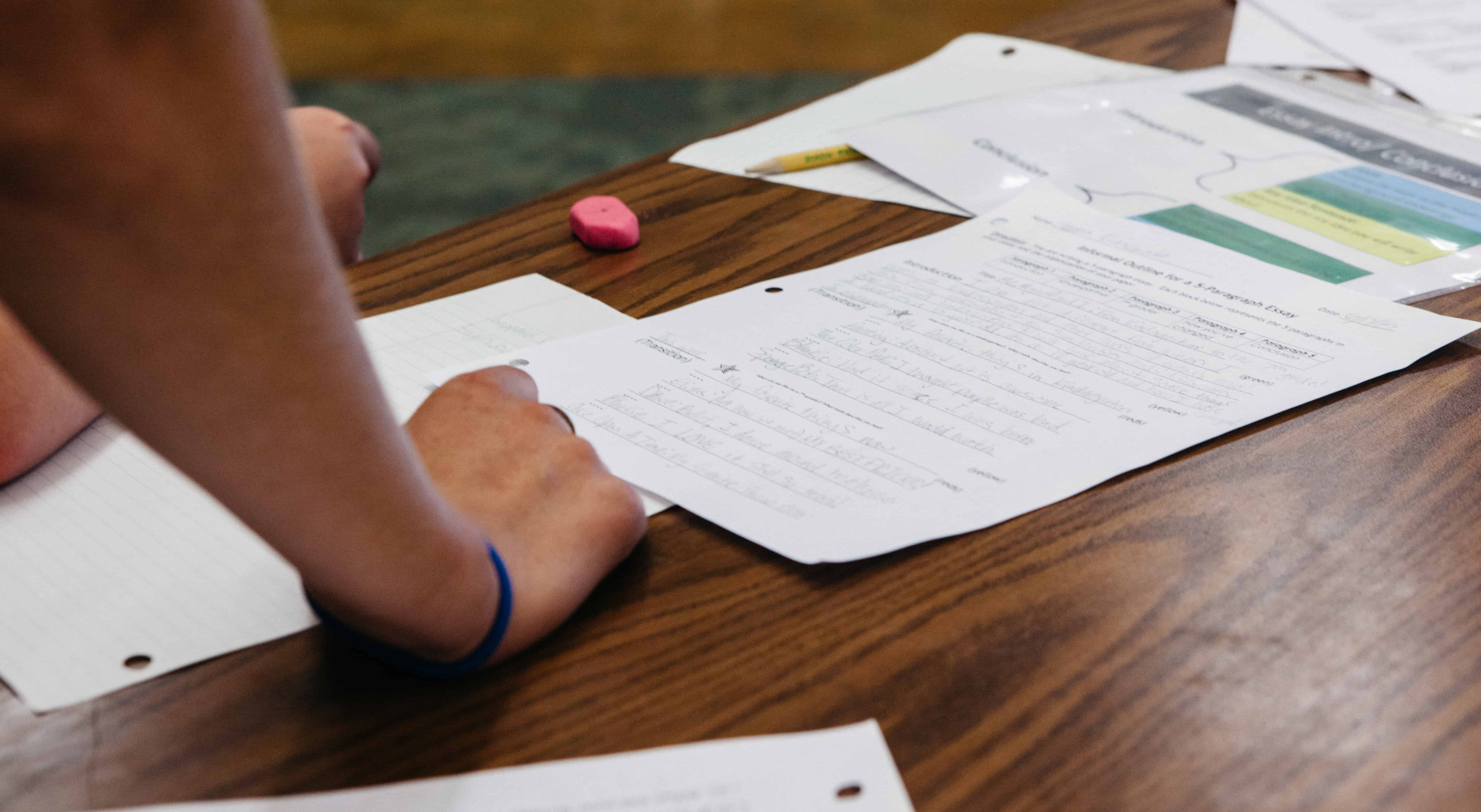
The school year has begun. The initial euphoria induced by the smell of new pencils will be wearing off, however, and we parents and teachers need to get ready for the question that students will inevitably ask: Why do I have to learn this stuff?!
If we want to avoid mutiny, we need to have a good answer ready for each school subject. But now, teachers and parents out there, I have a further question for you. Is your answer to the why-do-we-have-to-learn-this-stuff question a Christian answer, a biblical answer? If not, I?m going to offer you a two-part biblical answer: image and dominion.
One Insufficient Answer
Let?s first, however, clear away the most common answer?not because it?s bad, but because it?s incomplete. And, okay, maybe a little lazy.
Parents and teachers are tired, I know. We have all experienced that revelatory moment when we have vacuumed up a Lego piece because the energy required to pick it up and find where it belongs was simply too great. We may all collectively be excused sometimes for answering, ?Why do I have to learn this stuff? with the somewhat lazy answer, ?Because I said so.?
Now if kids get this answer, they have been told by God?s holy Word that they must obey. ?Children, obey your parents?; ?Obey those who have the rule over you.? That?s straight Bible. So if a mom or teacher says, ?Learn these spelling words because I said so,? students know the will of God for their next twenty minutes. They don?t have to pray for guidance: ?Lord, should I learn how to spell absquatulate, boustrophedon, and codswallop, or should I doodle pictures of small dogs?? No, they know the answer: God says, learn to spell absquatulate.
?Because-I-said-so? is not wrong to say, but it?s not enough, especially as kids get older. That?s 1) because it leaves out key Bible teaching, and 2) because, especially as students grow, they need to be motivated by the right loves or they?ll short-circuit the learning process. ?Because I said so? will not produce maturity. Even God himself uses explanation and argument (see any Pauline epistle). Parents and teachers ought to give, and Christian students ought to want, the best biblical reasons for learning all this stuff.
The Best Basic Biblical Answers
It?s time we let God give us some guidance. We need the Bible, page 1. This is absolutely basic, but I wonder how many teachers in Christian schools have ever worked to connect it to Christian education.
Then God said, ?Let us make man in our image, after our likeness. And let them have dominion over the fish of the sea and over the birds of the heavens and over the livestock and over all the earth and over every creeping thing that creeps on the earth.?
So God created man in his own image,
in the image of God he created him;
male and female he created them.
And God blessed them. And God said to them, ?Be fruitful and multiply and fill the earth and subdue it, and have dominion over the fish of the sea and over the birds of the heavens and over every living thing that moves on the earth.? (Genesis 1:26?28 ESV)
Biblically speaking, kids have to learn this stuff?and teachers have to teach this stuff?because 1) students are made in the image of God and because 2) their Creator blesses them with the task of dominion. Image and dominion. That?s why they have to learn math and grammar and history and science and literature.
1. Learn because you are made in the image of God.
Genesis 1:26?28 doesn?t explain what it means to be made in the image of God. Students of the Bible have worked hard to figure it out; the survey of current literature in Berkouwer?s study alone, written 60 years ago, is nearly exhausting. When scholarly opinion is so divided, I like to try pulling back and starting with the lowest common denominator. At the very least we can say this: to be made in the image of God means to be like God. We are similar to God. We are not gods. But the Bible never says that anyone else is ?made in God?s image.? We, apparently, are more like God than anyone or anything else is.
If you had never read Genesis before, and you encountered this statement that we are made to be like God, what would you think it means? What do you know about God by reading just the first chapter of Genesis?
You know that he is a creator. In the beginning, God created all this stuff.
The artistry and music of God?s creation is incredible, even after the fall. My three little parakeets can project more joy in their happy tweeting than the greatest human composers, because their song was written by God. Zoom in close on just one of those neon yellow feathers, and you see unbelievably beautiful color and shape and texture and symmetry and proportion.
To be truly like God, we need to be creators of various sorts, too. Education, biblically understood, consists in Christian parents and teachers trying to hand students the tools to create with something like the artistry of God.
What humans create can be incredibly beautiful and refined and tasty and satisfying. But it can also be ugly and dumpy and sour and frustrating, and not just because of sin. Failed creation also happens if someone just never learns how to do things well in school. Every scale a piano teacher has the student plunk out, every pinch of nutmeg a mom tells a child to toss into a cake batter, every birth and death date a history textbook requires for a test, every dangling modifier an English teacher has students correct, every boustrophedon kids must absquatulate?is a tool these students can use to display the creative beauties of God.
A student asks, ?Why do I have to learn this stuff?? It?s because they are made in the image of God and need to train to use their God-given creative abilities. They are made to be like God, but they can be more like God if they learn all the stuff teachers try to teach in school.
2. Learn because you are blessed with the task of dominion over God?s creation.
God said in Genesis 1 that we are blessed to ?subdue? this earth and to ?have dominion? over it. What do these blessed tasks have to do with school?
- To ?subdue? is to take something that?s resisting you and put it under human control. To subdue the earth is to take a plot of ground unsuitable for human habitation and put in plumbing lines and build a house.
But subduing isn?t just about farming and houses. It?s about school.
When a student first looks at a page full of number problems, the page is not subdued. The problems are totally disordered in the student?s mind. But when the student applies their mind to the page, using the mathematical tools handed to them by their teachers, they can subdue that page, bring it under human control.
When a student first look at a page full of grammar errors, the page is not subdued. It is totally disordered. But when the student applies their mind to the page, using the grammatical tools handed to them by their teachers, they can subdue that page, bring it under human control.
And right now, nobody but Mom or Dad may notice or care if a given student does all this subduing. But some day, the page of subdued math problems may help your neighbor drive safely across a bridge, and even earn the student, now an engineer, some money to provide for a full family of kids crying ?Feed me, feed me!? Some day, the page of grammar errors a student fixes could do the same: it could be a powerful, beautiful voice for truth in a broken world.
- To have ?dominion? is to rule; it?s a word we use for kings. And God is telling all people, all of his image-bearers, to fill and then subdue and rule the planet.
We?re told, in other words, to maximize the world?s usefulness for mankind, to press God?s world toward the ideals for which he made it (language I borrow from a mentor). And kids can exercise dominion. Kids can make the world a better place out of love for and obedience to God. They can start with cleaning their rooms.
But they shouldn?t stop there, even now. School is all about giving you tools for the kind of dominion you?re going to have more and more of as you grow. Maybe God will call them, in a few short years, to be an apprentice in an electrical business, or an intern in a design firm. What skills will they need to rule over their areas of responsibility well for God?s glory and your neighbor?s good? Lots, I can tell you, from every subject offered in school. Maybe God will call someone to be a mom. What skills will a woman need to rule her little brood well? More than anyone could possibly list in this, one of the highest of all callings.
Think of one thing that a lot of kids struggle with and even hate: writing. Writing is one of the most powerful tools for dominion in existence. It is capable of organizing the thinking and persuading the hearts of millions?or even of just one person, and that may be even more important. Whether you feel positively toward our current U.S. president or not, no one can deny that his Twitter feed has exerted real power over American culture. How could 140 characters at a time (or, with our president, more like 37 at a time) have such influence? Our world is full of writers, a never-ending stream of writing, because it is a tool for dominion.
I discovered the power of writing when I wrote a book that released in January (Authorized: The Use and Misuse of the King James Bible). I?ve written books before, but this was the first one I conceived and pitched and wrote completely on my own. I was not asked or paid to do it. Pretty much all the ideas in that book had been in my head for years. I had even written a lot of them on my obscure, personal blog. But only when I put them in a published book did the ideas start seeming real to people beyond the faithful friends who read that blog (Hi, Mom!). I started to get lots and lots of emails and friend requests and opportunities and interviews. (And an Authorized documentary starts shooting in October!) Only with the publication of a book did I start really exercising dominion, rule, influence through my ideas. I, by God?s grace, did the hardest thing known to man: I was God?s tool for changing people?s minds. This all came as a delight, and as an answer to prayer. I love to do what I?m designed to do: glorify God and serve my neighbor through writing.
God doesn?t need me or you; he can rule his world just fine without us. But he actually deigns to use us as his tools. You and I are, and any students we teach, called to be a sub-rulers under the Great King.
Students ask, ?Why do I have to learn this stuff?? Because the stuff they are taught in school comprises the tools they need to subdue the earth and have dominion over it under the greater rule of God.
(If you don?t already know it, it?s good at this point to learn a technical term: these verses in Genesis 1 have often been called the ?Cultural Mandate.? That?s because anyone who lives them out will find himself or herself doing all the kinds of things that make up a culture, including all the liberal arts and all the other stuff we learn in school. For the Christian, school subjects are not just the things we learn while we bide our time waiting to be taken to heaven. They are part of our calling as people created in the image of God and blessed with the task of ruling God?s world.)
Conclusion
I?m a writer, so a lot of my heroes are writers. And the greatest of them all, my top writer hero, is C.S. Lewis. And the most powerful thing he ever wrote, out of countless creative, loving, influential attempts to subdue the earth and have dominion over it through English prose, was a essaystic sermon he called ?The Weight of Glory? (the titular essay in this collection). I have pondered this piece so often. It?s simple and yet profound.
Lewis points out that the best motivation for something is always love for the natural rewards that thing brings. Generals should fight battles because they love victory, the natural reward of battle. A couple should date because they love marriage, the natural reward of romance. And kids in school should study because they love the pleasures that are the natural reward of that study. They should love learning to read because of the deep pleasures of a good book. They should love learning to write because of the deep pleasures of expressing oneself powerfully for the glory of God and good of neighbor.
But when you?re just learning that split infinitives are bad (only later to learn that they?re actually okay), you can?t really understand the great joy and power of expression that mastering accepted grammatical conventions will bring you?a joy teachers and parents should understand. So, Lewis says, a schoolboy
has to begin by working for marks, or to escape punishment, or to please his parents, or, at best, in the hope of a future good which he cannot at present imagine or desire.
But as a student gets older, he or she will start to get what that good thing is. The future good will be a ?joy?set before him.? Lewis says,
Enjoyment creeps in upon the mere drudgery, and nobody could point to a day or an hour when the one ceased and the other began.
Adults know this transition is coming, for nearly all children in at least one subject (or vocational field). That?s what we mean when we say a given subject is our favorite: it?s the one in which we?ve discovered the natural joys created within it. But if a student is not yet ready to understand the connection between God?s image, the Cultural Mandate, and a spelling list, I?d at least like to suggest an alternative to ?Because I said so.? This alternative is just as easy to remember and use, but it places the emphasis in what I consider a healthier place.
Student: Why do I have to learn this stuff?
Adult: Trust me.
* * *
Some recommended reading:
- Biblical Worldview: Creation, Fall, Redemption, Mark Ward
- Every Square Inch, Bruce Riley Ashford (and the rest of the Cultural Engagement bundle)
- Creation Regained: Biblical Basics for a Reformational Worldview, Al Wolters
- ?The Weight of Glory,? C.S. Lewis
Mark Ward received his PhD from Bob Jones University in 2012; he now serves the church as an Academic Editor at Lexham Press, the publishing imprint at Faithlife. His most recent book,?Authorized: The Use and Misuse of the King James Bible, contains fun linguistic explorations and also jokes that his wife, at least, found amusing.






